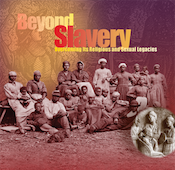Beyond Slavery
Explore the Conference
Explore the Conference by Subject
Slavery in Christian, Jewish, and Muslim Scripture and Religious Law
Christianity, Religion of the Slaveholders and the Enslaved
Sexual Assault and Exploitation Under U.S. Slavery and Jim Crow
How Slavery Has Shaped Our Understandings of Marriage and Friendship
Slavery, Violence, and the State
Beyond Slavery:
Overcoming Its Religious
& Sexual Legacy
Ellen Barry:
African American Women in United States Prisons: The Modern State - Sanctioned Slavery System
The system of slavery in the United States is the key to understanding the institutionalized racism that infests every level of our criminal justice system. Just as many whites once considered slavery a necessary and justifiable institution, today many whites see our criminal justice system as fair and unbiased despite its racially discriminatory impact. And just as many whites once viewed slaves as inferior and naturally suited to brutal treatment, many whites today see African Americans in prison as criminals who are bad and deserving of punishment well beyond the sentences they received. Although people of color have been over-represented in the prisons and jails in this country from its inception, the increase in disproportionate arrest, prosecution, conviction and incarceration has escalated in the past four decades. The current system destroys communities of color by criminalizing its members. The criminalization of color hits women particularly hard, not only when they are left to hold the fort at home, but also when they are imprisoned themselves and suffer sexual violence, torture, the denial of medical care, the loss of control over their own fertility, and the removal of their right to raise their children. Fifty years from now, if we continue along this route, we will find that we have created a world so deeply divided that no bridge exists that can span it. We must urgently address the detrimental long-term effects of the current criminal system on communities of color in this country.
This video was recorded on October 15-16, 2006 as part of the conference, "Beyond Slavery: Overcoming Its Religious and Sexual Legacy." It was sponsored by the Feminist Sexual Ethics Project in the Near Eastern and Judaic Studies Department at Brandeis University.
